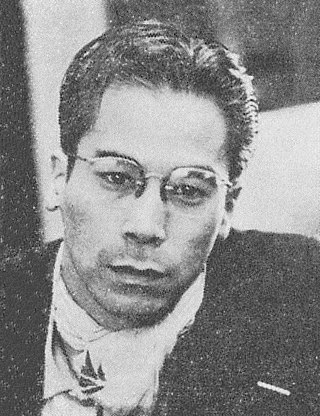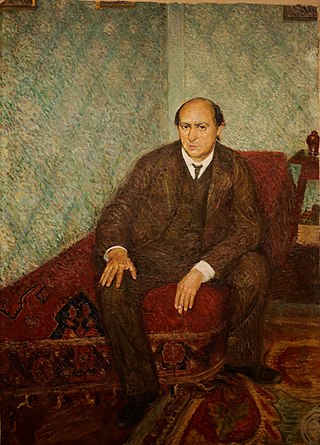Related Research Articles
A concerto is, from the late Baroque era, mostly understood as an instrumental composition, written for one or more soloists accompanied by an orchestra or other ensemble. The typical three-movement structure, a slow movement preceded and followed by fast movements, became a standard from the early 18th century.
The Cello Concerto No. 2, Op. 126, was written by Dmitri Shostakovich in the spring of 1966 in the Crimea. Like the first concerto, it was written for Mstislav Rostropovich, who gave the premiere in Moscow under Yevgeny Svetlanov on 25 September 1966 at the composer's 60th birthday concert. Sometimes the concerto is listed as being in the key of G, but the score gives no such indication.
Unsuk Chin is a South Korean composer of contemporary classical music, who is based in Berlin, Germany. Chin was self-taught piano from a young age and studied composition at Seoul National University as well as with György Ligeti at the Hochschule für Musik und Theater Hamburg.

The E-flat clarinet is a member of the clarinet family, smaller than the more common B♭ clarinet and pitched a perfect fourth higher. It is typically considered the sopranino or piccolo member of the clarinet family and is a transposing instrument in E♭ with a sounding pitch a minor third higher than written. In Italian it is sometimes referred to as a terzino and is generally listed in B♭-based scores as terzino in Mi♭. The E-flat clarinet has a total length of about 49 cm.

The NDR Elbphilharmonie Orchestra is a German radio orchestra. Affiliated with the Norddeutscher Rundfunk, the orchestra is based at the Elbphilharmonie in Hamburg, Germany. Earlier the ensemble was called the NDR Symphony Orchestra, and was also known in English as the North German Radio Symphony Orchestra.

The Seoul Philharmonic Orchestra (SPO) is a South Korean orchestra based in Seoul. Founded in 1948, it is one of the oldest orchestras in South Korea. Its first foreign tour came on a 1965 trip to Japan, followed by performances in Southeast Asia in 1977, the United States in 1982, 1986, and 1996, a 1988 tour of Europe before the Seoul Olympics that year, and a 1997 performance in Beijing. The Philharmonic is an incorporated foundation since 2005.
Aus Italien, Op. 16, is a tone poem or program symphony for orchestra by Richard Strauss, described by the composer as a "symphonic fantasy". It was completed in 1886 when he was 22 years old. It was inspired by the composer's visit to Italy in the summer of the same year, where he travelled to Rome, Bologna, Naples, Sorrento, Salerno, and Capri. He began to sketch the work while still on the journey.

Kazuo Yamada was a Japanese conductor and composer.

Tongyeong International Music Festival, abbreviated TIMF, is an annual music festival held in Tongyeong, South Gyeongsang Province, South Korea. Considering the classification between ethnic and artistic categories, TIMF may be classified into one of Korea's leading arts and music festivals which is specialized in western music, i.e. with a variety of style and genre, such as contemporary, early(baroque), classical, romantic, traditional, symphonic, chamber or ensemble, operatic or music theater. In spite of its various appetite for genre, TIMF is usually known as being strong in contemporary program of western style music. The artistic director is the composer Unsuk Chin.

The Chamber Symphony No. 1 in E major, Op. 9 is a composition by Austrian composer Arnold Schoenberg.
Symphony No. 1 is a symphony in one movement by the American composer Christopher Rouse. The work was commissioned by David Zinman and the Baltimore Symphony Orchestra, completed on August 26, 1986, and premiered in Baltimore, January 21, 1988. The piece is dedicated to Rouse's friend and fellow composer, John Harbison.
The Symphony No. 5 is a symphony for orchestra by the American composer Christopher Rouse. The work was jointly commissioned by the Dallas Symphony Orchestra, the Nashville Symphony, and the Aspen Music Festival. It was completed in Baltimore on February 15, 2015, and was first performed by the Dallas Symphony Orchestra under the direction of Jaap van Zweden at the Morton H. Meyerson Symphony Center on February 9, 2017.
The conductor Bernard Haitink recorded works, especially symphonies and other orchestral works, with different orchestras. He made recordings for several labels, including Philips Records, EMI Classics, Columbia Records, LSO Live, RCO Live, and CSO Resound.
Nomade - Concerto for Cello and Orchestra is a composition for solo cello and symphony orchestra by Finnish composer Sebastian Fagerlund. The world premiere of the concerto was at the Elbphilharmonie concert hall on February 15, 2019 in Hamburg, Germany by NDR Elbphilharmonie Orchestra and cellist Nicolas Altstaedt, conducted by Hannu Lintu. The Finnish premiere took place with the Finnish Radio Symphony Orchestra conducted by Lintu and with soloist Altstaedt on April 11, 2019.
Melody, also known as Melody in A minor, is a musical composition by the Ukrainian composer Myroslav Skoryk. Composed for the 1982 Soviet war film Vysokyy pereval, it has a simple structure comprising an opening theme, short development section, and modified reprise of the original theme. It was originally scored for flute and piano but has since been arranged for many other instrumentations. Melody is Skoryk's most popular work and is frequently performed in concerts, including in response to the 2022 Russian invasion of Ukraine.
Unsuk Chin's Violin Concerto No. 1 was written in 2001 on a commission from the Deutsches Symphonie-Orchester Berlin, where she was then serving as composer-in-residence. It was given its world premiere by the violinist Viviane Hagner and the Deutsches Symphonie-Orchester Berlin conducted by Kent Nagano at the Berliner Philharmonie on January 20, 2002. The piece was awarded the prestigious Grawemeyer Award for Music Composition in 2004. Unsuk Chin later composed a second Violin Concerto, Scherben der Stille , in 2021.
The Violin Concerto No. 2, Scherben der Stille , is the second violin concerto by the Korean composer Unsuk Chin. It was written for the violinist Leonidas Kavakos in 2021 on a joint commission from the London Symphony Orchestra supported by the Ernst von Siemens Music Foundation, the Boston Symphony Orchestra supported in part by the Massachusetts Cultural Council's New Works Fund, and the Leipzig Gewandhaus Orchestra. The piece was given its world premiere by Kavakos and the London Symphony Orchestra conducted by Simon Rattle at the Barbican Centre, London, on January 6, 2022.
Unsuk Chin's Clarinet Concerto was written in 2014 on a joint commission from the Gothenburg Symphony Orchestra, WDR Symphony Orchestra Cologne, Philharmonia Orchestra, Barcelona Symphony Orchestra, and the New York Philharmonic. A partial premiere of piece was given by the clarinetist Kari Kriikku and the Gothenburg Symphony Orchestra conducted by Kent Nagano at the Gothenburg Concert Hall on May 8, 2014; the complete concerto was given its world premiere by Kriikku and the New York Philharmonic conducted by Alan Gilbert at Avery Fisher Hall on September 23, 2014.
SPIRA—Concerto for Orchestra is an orchestral composition written in 2019 by the South Korean composer Unsuk Chin. It was commissioned by the Los Angeles Philharmonic, which gave the piece its world premiere under the direction of Mirga Gražinytė-Tyla at the Walt Disney Concert Hall on 5 April 2019.
Rocaná is an orchestral composition written in 2008 by the South Korean composer Unsuk Chin. The work was commissioned by the Montreal Symphony Orchestra, the Bavarian State Opera, the Seoul Philharmonic Orchestra, and the Beijing Music Festival. Its world premiere was given by the Montreal Symphony Orchestra conducted by Kent Nagano at the Salle Wilfrid-Pelletier, Montreal, on March 3, 2008.
References
- 1 2 3 Unsuk Chin (2019). "Frontispiece for orchestra". Boosey & Hawkes . Retrieved 30 July 2023.
- ↑ Hubbard, Rob (12 February 2022). "On a chilly night, even 'Firebird' fails to ignite the Minnesota Orchestra". Star Tribune . Retrieved 30 July 2023.
- ↑ Cantrell, Scott (18 March 2022). "Dallas Symphony brilliantly performs less familiar works by Strauss, Shostakovich and Unsuk Chin". The Dallas Morning News . Retrieved 30 July 2023.
- ↑ Oliver, Richard Sylvester (18 March 2022). "Albrecht leads a reconfigured Dallas Symphony in Strauss, Chun and Shostakovich". Texas Classical Review. Retrieved 30 July 2023.